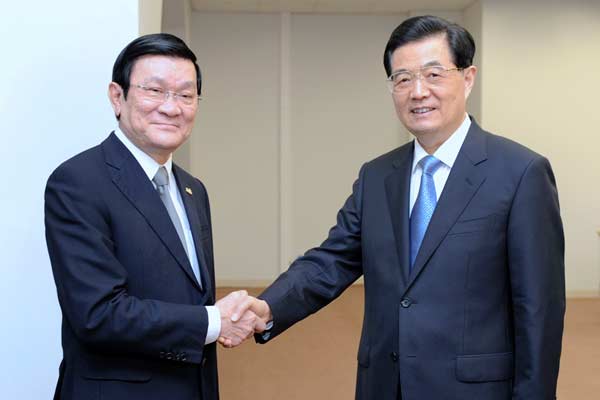Hu calls for calm and restraint on sea issue
Updated: 2012-09-08 02:01
By Wu Jiao in Vladivostok, Russia, and Cheng Guangjin in Beijing (China Daily)
|
||||||||
Nation keen to 'work together' with others to solve disputes
China and Vietnam should keep cool-headed and restrained on the South China Sea issue, President Hu Jintao said on Friday.

President Hu Jintao meets Vietnamese President Truong Tan Sang at the sidelines of the Economic Leaders’ Meeting of the Asia-Pacific Economic Cooperation in Vladivostok, Russia, on Friday. [Photo by Xie Huanchi / Xinhua] |
He also expressed China’s willingness to work together with the Association of Southeast Asian Nations for regional peace and stability.
Hu made the remarks while attending meetings with Vietnamese President Truong Tan Sang and Brunei’s Sultan Hassanal Bolkiah on the sidelines of the 20th Economic Leaders’ Meeting of the Asia-Pacific Economic Cooperation scheduled for Saturday and Sunday.
"There have been some difficulties with China-Vietnam relations because of the dispute of the South China Sea. This is what we don’t want to see," Hu said in the meeting with Sang.
Hu urged the two countries to adhere to bilateral negotiations and a political solution to the dispute, and adhere to joint development and the path of shelving disputes.
Hu said the two sides should keep cool-headed and restrained and avoid taking any unilateral measure that will magnify, complicate or internationalize the dispute, to prevent the issue from affecting East Asian cooperation and regional stability.
Sang said Vietnam is ready to work with China, keeping in mind the strategic interests of bilateral ties, and properly solve the maritime issue through peaceful negotiations.
While meeting Brunei’s leader, Hu said the South China Sea issue is a chronic headache that should be resolved properly through dialogue and negotiations.
Together with ASEAN members, China is willing to implement the Declaration on the Conduct of Parties in the South China Sea, promote pragmatic cooperation on the South China Sea and maintain regional peace and stability, Hu said.
Brunei will replace Cambodia as ASEAN chair in 2013.
Some ASEAN members, including Vietnam and Brunei, claim some islands and waters, which belong to China, in the South China Sea, a region rich in oil and gas. While the declaration asked all claimants not to take measures that would intensify differences, some ASEAN countries have kept provoking the issue.
China sticks to bilateral talks to solve the issue.
"It’s not easy to resolve the disputes as it’s a matter of a country’s territory and sovereignty," said Jia Xiudong, a senior researcher on international affairs at the China Institute of International Studies.But both China and Vietnam have shown goodwill in managing their differences and bringing them under control. It’s their common wish not to let the disputes damage bilateral relations," Jia said.
Xu Liping, an expert on Southeast Asian studies at the Chinese Academy of Social Sciences, said China and Vietnam have a broad range of interests. "As long as the two countries have strategic mutual trust, there is a way to solve the disputes."
Last year, the two countries signed an agreement on basic principles guiding the settlement of maritime issues.
China and Vietnam should remain committed to friendly consultations to properly handle maritime issues and make the South China Sea a sea of peace, friendship and cooperation, the agreement said.
Jia said the Friday meeting between Chinese and Vietnamese leaders came amid the simmering disputes and it will help manage differences. "The key for now is that the two countries implement the agreement the two nations signed last year as a guide for resolving the disputes."
Hu’s meeting with the leader of Brunei, which has not taken intense actions to handle the disputes, has positive effects on the issue, Jia said.
It’s the common goal for both China and ASEAN to maintain stability in the South China Sea, and all ASEAN members have the responsibility to play a constructive role in the peace and stability in the region, Jia said.
"What ASEAN can do is to not flare up the conflict and urge its members not to take moves that will complicate the situation. At the same time, it should continue to promote cooperation with China, especially in economic and trade ties," Jia said.
"As the chair of ASEAN next year, Brunei can do a lot in this regard," Jia said.
Territorial disputes will give way to the increasingly enhanced economic and trade ties between China and Southeast Asia, Xu said.
Contact the writers at
wujiao@chinadaily.com.cn and chengguangjin@chinadaily.com.cn

 Relief reaches isolated village
Relief reaches isolated village
 Rainfall poses new threats to quake-hit region
Rainfall poses new threats to quake-hit region
 Funerals begin for Boston bombing victims
Funerals begin for Boston bombing victims
 Quake takeaway from China's Air Force
Quake takeaway from China's Air Force
 Obama celebrates young inventors at science fair
Obama celebrates young inventors at science fair
 Earth Day marked around the world
Earth Day marked around the world
 Volunteer team helping students find sense of normalcy
Volunteer team helping students find sense of normalcy
 Ethnic groups quick to join rescue efforts
Ethnic groups quick to join rescue efforts
Most Viewed
Editor's Picks

|

|

|

|

|

|
Today's Top News
Health new priority for quake zone
Xi meets US top military officer
Japan's boats driven out of Diaoyu
China mulls online shopping legislation
Bird flu death toll rises to 22
Putin appoints new ambassador to China
Japanese ships blocked from Diaoyu Islands
Inspired by Guan, more Chinese pick up golf
US Weekly

|

|






